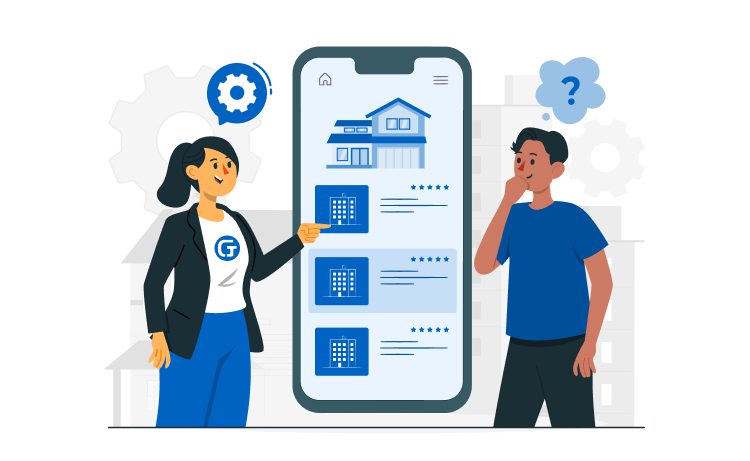
How AI and ML are to Improve the Real Estate Sector?



Throughout the whole history of humankind, sizeable industrial production has always been leading innovation. Production pushed forward both industrial and post-industrial revolutions. Production gave birth to automation, digitization, robots, and more.
The services sector has always been one step behind in this direction. When it comes to the implementation of the most recent innovations, services seem to be incredibly reluctant.
In 2021, however, the situation started to change. Under the pandemic, even the most traditional services moved online and operated virtually. Booking a time slot in a gym through an app, video conferencing with the therapist, virtual showrooms instead of the usual ones. All these and other innovations became quickly habitual in the services sector.
Real estate has not been lagging when it comes to digitization and automation, especially. These days the real estate sector is leading and even pioneering in multiple directions. These include data mining, machine learning, consumer trends analysis based on big data and the Internet of Things.

Content
For starters, let’s recap the basics.
Artificial intelligence is the technology based on the simulation of human intelligence; it allows computer systems to analyze vast amounts of data and provide conclusions “in a human way.”

Machine learning is one of the ways to apply artificial intelligence. Using algorithms on large volumes of data, ML allows constructing precise and highly detailed predictions about future events and long-term trends.

Both AI and ML are excellent tools for understanding changing consumer trends, buying preferences, price fluctuations, and so on.
In the case of AI in real estate specifically, we can single out the following trends gaining traction today:
Residential housing is actively expanding these days in both metropolitan and suburban areas. Commercial real estate is gradually recovering from the pandemic, with many buildings being reconstructed and converted.
This means a wider variety of propositions and increasingly more time needed for a thorough search on the buyer side. Neither buyers themselves nor brokers/agents have enough time for that.
Machine learning in real estate has made home search overall and filtering through offers much easier and more efficient.
With machine learning, filtering through a marketplace can be based on:
Content analysis and meta-analysis can also be part of this comprehensive intelligent search.
The latest global financial crisis started as the subprime mortgage crisis. For many homebuyers, the situation turned out to be a real tragedy, with bankruptcies, ruined families and suicidal thoughts.
Timely prediction of threatening (or promising!) trends allows brokers and homebuyers/owners to understand the perfect time to sell/buy property.
Such application of machine learning in real estate is also of tremendous investment interest. A complete picture of long-term fluctuations and market anomalies provides hedge funds and other investment companies with an unbeatable competitive edge. It guarantees their decision-making is always following the realistic market trend.
Nowadays, any buyer’s intention starts with a simple Google search. Intending to buy or rent, people are surfing through multiple marketplaces.
At one point in time, thousands of people might be visiting the same page. Some of them are seriously comparing prices. Others are just randomly looking through photos.
So does a real estate agent detect solid leads and sort out the raw ones?
Real estate AI offers a range of tools for that. First, AI analyzes consumers’ behavior on the website:
Then, the AI detects and classifies the qualified leads and supplies them with the necessary data. It includes the appointments schedule, toll-free phone line, customer reviews, etc.
Once the client has chosen a real estate object, there comes the most tiring and meticulous part — credit score analysis, property valuation, and contract negotiations.
All of the above assumes tons of paperwork, and all this paperwork must be impeccable, error-less.
At this stage, AI in real estate becomes the broker’s best friend:
It would be hard to provide exact ROI calculations here. However, real estate ML implementation can save at least one business day a month on paperwork for a small agency.
Have you ever noticed that two almost identical houses a two-minute walk apart may cost very differently? This is not because the real estate market is unfair or because the seller has inflated expectations.
Real estate valuation these days becomes the function of data scientists and AI machines at their services.
With machine learning, real estate valuation finally becomes genuinely unbiased. 100% objective process that considers all the variety of geospatial factors:
AI calculates this with extreme precision on a granular level. Thus, even houses within the same zip code area can be subject to a detailed microanalysis, with differences presented on a spectrum of high specific, customer-centric parameters.
We are living through times when deals can be closed in a matter of minutes. There is hardly enough time for reflections, and decision-making must stem from the instantly generated data analytics. Using AI in real estate can benefit all the parties involved — sellers, buyers, and real estate brokers.
If you want to transform your real-estate agency with custom AI solutions, don’t hesitate to contact us – real estate software development. There was no better time for this ever.









| Cookie | Duration | Description |
|---|---|---|
| cookielawinfo-checkbox-analytics | 11 months | This cookie is set by GDPR Cookie Consent plugin. The cookie is used to store the user consent for the cookies in the category "Analytics". |
| cookielawinfo-checkbox-functional | 11 months | The cookie is set by GDPR cookie consent to record the user consent for the cookies in the category "Functional". |
| cookielawinfo-checkbox-necessary | 11 months | This cookie is set by GDPR Cookie Consent plugin. The cookies is used to store the user consent for the cookies in the category "Necessary". |
| cookielawinfo-checkbox-others | 11 months | This cookie is set by GDPR Cookie Consent plugin. The cookie is used to store the user consent for the cookies in the category "Other. |
| cookielawinfo-checkbox-performance | 11 months | This cookie is set by GDPR Cookie Consent plugin. The cookie is used to store the user consent for the cookies in the category "Performance". |
| viewed_cookie_policy | 11 months | The cookie is set by the GDPR Cookie Consent plugin and is used to store whether or not user has consented to the use of cookies. It does not store any personal data. |